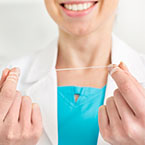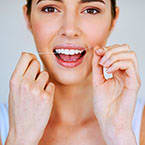Dental Floss Types

Table of Contents
Types of Dental Floss
The choices for a product as basic as dental floss can seem overwhelming, but you can’t go wrong with a choice of floss as long as you use it every day.
Each type of dental floss has pros and cons. Here are a few points to keep in mind about your flossing options:
- Unwaxed floss is thin nylon floss made of about 35 strands twisted together. It fits into tight spaces if your teeth are close together, but it can be prone to shredding or breaking.
- Waxed floss is a standard nylon floss with a light wax coating. It is less likely to break, but the wax coating may make it harder to use in tight spots.
- Dental tape is broader and flatter than standard floss and comes in waxed or unwaxed versions. People with more space between their teeth often find dental tape more comfortable to use than standard floss.
- Super flosses are made from yarn-like material that has stiffer sections on each end that can be used to clean around braces or dental bridges.
Facts About Floss
- Why does Oral-B Glide dental floss feel different than it used to? Has the product changed?
Glide floss has a new microtextured fiber to clean and comfortably help protect teeth from cavities. There is a noticeable difference in the scrubbing texture and feel of the new floss, which helps clean and glide in tight spaces.
- Do any Oral-B (Glide) dental floss products contain PTFE or PFAS?
The new Glide floss fiber material is no longer formulated with PTFE. With the new micro-textured fiber, none of our floss products are formulated with PTFE or any type of PFAS.
- What is Oral-B Glide dental micro-textured dental floss made from? Did the Oral-B Glide floss material change?
The new Oral-B Glide micro-textured floss is made of soft, gentle, nylon and an elastic material that offer triple action cleaning, softness, comfort and durability that is tear resistant.
- What are the benefits of the new fiber used in Oral-B floss products?
The new micro-textured fiber is designed to slide easily between tight spaces and grab plaque while providing a gentle yet powerful clean and it is also no longer formulated with PTFE.
The Benefits of Flavored Floss
The types of flosses mentioned above may also be flavored. If your children aren’t enthusiastic about flossing, remind them that floss with a mint flavor can not only enhance their smiles by removing potentially embarrassing food pieces, but it can also help promote fresh breath, which might get them motivated to do their flossing before school.
Adults can appreciate flavored floss, too. If you see students, clients or patients throughout the day with little time for oral care until you get home at night, a flavored floss may be just what you need after lunch. And if you don’t want the mint in your floss to clash with the mint in your toothpaste, keep mint-flavored floss in your desk for midday dental care and use an unflavored floss with your toothpaste of choice as part of your evening oral care routine.
Everyone deserves to benefit from flossing. But not everyone can floss their teeth easily. Some examples include young children who are just learning to floss, older adults who may have arthritic hands and limited finger flexibility, and anyone who doesn't like putting their fingers into their mouths. But even if you are in one of these categories, you can still enjoy the benefits of flossing by using a floss holder, which is a handle with a curved end designed to hold a piece of floss.
Disposable Dental Flossers
Or you can buy disposable flossers. Disposable flossers are a particularly good choice for young children who may be less able to keep the floss holders reliably clean.
How to Use Dental Floss
When using a flosser, follow the same basic technique as when using regular floss. To use dental floss picks, move the flosser handle so the piece of floss curves around the tooth in a "C" shape. Gently work the floss under the gum line and slide the floss up to the top of the tooth, going up and down several times.
Do Electric Flossers Work?
Electric flossers provide another alternative for people who have a hard time manipulating floss. Most electric flossers have ergonomic handles and some types have angled heads to make reaching back teeth even easier. Also, electric flossers promote oral health by gently stimulating the gums. The Oral-B Water Flosser Advanced helps give your flossing game a major boost, when paired with traditional floss. Its unique Oxyjet Technology uses water enriched with microbubbles of air to help eliminate plaque bacteria for healthier gums. But young children, older adults or anyone who has a very unsteady grip should not use an electric flosser unsupervised.
Only from Oral-B, the #1 brand used by dentists worldwide*.
*BASED ON SURVEYS OF A REPRESENTATIVE WORLDWIDE SAMPLE OF DENTISTS CARRIED OUT FOR P&G REGULARLY
Table of Contents
- Types of Dental Floss
- Facts About Floss
- The Benefits of Flavored Floss
- Disposable Dental Flossers
- Do Electric Flossers Work?
-
- Related Articles

Sign Up
for expert advice and exclusive offers

Sign Up
for expert advice and exclusive offers




